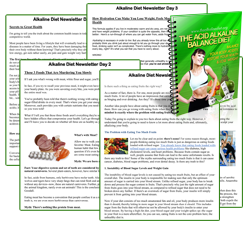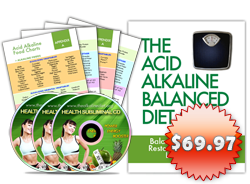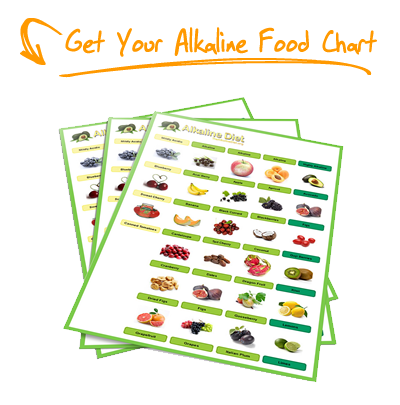Butter & Margarine – How Damaging Are Trans Fat To Your Body
Posted on 30. Apr, 2010 by Staff Writer Candy Del Carmen in Alkaline Diet Tips, Blog
If you are an ordinary person who goes to a supermarket, you may not bother to look the nutrition facts label of the products you love to eat. You may be thinking that as long as the foods you consume are manufactured by trusted and well-known food industries, there is nothing wrong in what you eat. If you would give few minutes to analyze the label of the food, you may see “trans fats”, or “partially hydrogenated oil”.
The most common products with high in trans fats can be found in margarine and butter. Nearly all consumed foods are with margarine and butter like cakes, pastries, and others. You may be thinking what is wrong with trans fats?
There is absolutely wrong with trans fats! This article will give the readers essential information how damaging trans fats to our body, especially by consuming excess amount of butter and margarine in our daily diet. It may serve as an eye-opener for our consumers to be smart shoppers and never get duped to misleading labels of food products they consume.
Natural and Artificial Trans Fats
Where does trans fats come from? It occurs in the milk and body fats of cattle and sheep (called ruminant animals that chew cud) with total of 2-5% of fat. Therefore, any ruminant animal-based fats are considered natural trans fats.
NOTE: Processed meat manufactured by food industry becomes high in trans fat due to adding of partially hydrogenated fats which attributed to the displacement of natural solid fats and liquid oils.
In 1930s, hydrogenation process is invented which double bonds of unsaturated fats are opened and added to hydrogen atoms. The chemical process is called partial hydrogenation when vegetable oil is reacted under hydrogen gas at 250-400 F in the presence of chemical catalysts (metals or salts) for several hours. When hydrogen atoms are altered to vegetable oils to make them solid in room temperature, then trans fats are man-made.
TRIVIA: During Napoleon time in 1800, a margarine using tallow and buttermilk were invented to feed the troops, however it did not get any acceptance in the United States. In 1900s that soybeans began to import as a source of protein. Take note that the by-product is soybean oil. The shortage in butterfat in Western countries is the main reason for the invention of the method of hydrogenating fat.
Important Role of Lipase Enzymes in Fat Digestion
The lipase is digestive enzyme needed to digest fats. It is found in the pancreatic juice and stomach, and foods we consume. It helps to digest fats and lipids to maintain gall bladder function and control the amount of fat burned in the body, reducing the adipose tissue or fat stores. Its unique enzyme breakdowns fat without damaging the fat-soluble vitamins.
Too much fat can severely damage our health. On the other hand, let us also take note that some fat is also necessary. Enough fatty acids are essential to protect viable cells. Health care professionals recommended daily caloric intake should not be more than 30% of fat calories. It is when too much intake of fatty foods and not properly broken down, when people suffer from health problems.
Researches on Harmful Effects of Trans Fats
The bad health implications of trans fats are reported and proven in many clinical researches over the previous decade. Since 1958, hydrogenated vegetable oils or trans fats are said to be responsible in increasing risk of having heart attack.
The National Academy of Sciences recommends consumers, if not totally eliminating trans fats from food consumption, at least lower the trans fatty acids intake and observe adequate diet.
There are two conclusive reasons for their advice; first, it has NO nutritional value and benefits to our body, and secondly, it may lead to coronary diseases. It tends to raise levels of LDL or the total cholesterol which is known to be the bad cholesterol, and decreases the essential good cholesterol of HDL level. Not only that, trans fat is also linked to the increase inflammation in the arteries and change the composition of cell membranes, according to another research.
Supporting these findings, another medical research from the registered dietitian of University of Maryland Medical Center, Marybeth Sodus, claimed that man-made trans fats in butter and processed meat can increase the bad cholesterol and decrease the healthy cholesterol. Likewise, Dr Mary Enig, another researcher and specializing in nutrition of the same university, proved in 1978, that fat and vegetable intake is also associated in increasing cancer rates.
Why trans fats are used by manufacturers?
The used of hydrogenated oils for food production is mainly for the reason of increasing the shelf life of products and it’s capability to become resistant to rancidity.
For example, in any baked foods, butter, and margarine shortening are one of the main ingredients, which contain hydrogenated oils. These are used to suspend solids at room temperature. Instead of using palm oil, these very unhealthy alternatives become replacement to non-hydrogenated plant shortenings such as coconut oil, and palm kernel oil.
Foods with High Trans Fats
The Student Health Service of University of Pennsylvania interviewed Cindy Moore, director of nutrition therapy of Cleveland Clinic Foundation, about the list of foods containing high trans fats. Here are the lists of foods that consumers must avoid or lessen:
- Spreads such as margarine, butter and shortenings – it contains too much Trans fats and saturated fats. ( stick margarine- 2.8 grams trans fats, tub margarine- .6 grams trans fats, shortening-4.2 grams trans fats, and butter-.3 grams trans fats)
- Baked Foods – other mixes of cakes, pastries, donuts, and biscuits which contain shortenings and butter have several grams of trans fat.
- Soups such as ramen and soup cups
- Fast Foods – deep fried in hydrogenated oil like fries, chicken, pancakes, and burgers
- Frozen foods – frozen products including pies, waffles, breaded fish sticks, and pizzas
- Chips and crackers
- Chocolate bar with nuts and candies have higher fat content
- Toppings and dips such as nondairy products
The Best Alternatives in Man-made Trans fats
A University of Guelph researcher found a way for alternative way to replace trans fats in cooking; the mixture of oils including olive, soybean and canola to water, monoglycerides and fatty acids to make a cooking oil.
Furthermore, the Organic Trade Organization reported that the oil fruit from the palm can actually lowers blood cholesterol for it only contains 50% of saturated fat, 40% polyunsaturated fats, and only 10% monounsaturated fats.
Alternatively, if people would like to reduce saturated and trans fats in their diet, consider the use of olive oil, palm oils, and canola oils, which gives more benefits to health than any other butter, lard, and margarine shortening.
A World-wide Ban against the Use of Trans fats
Denmark is one of the countries become proponent of prohibition of trans fats. They introduce laws strictly regulating the sale of foods containing hydrogenated oils. It is worth noting that the law applies to the restriction on the ingredients used and not the final products itself. As the result, Switzerland followed trans fats ban beginning in April 2008.
Margarine in Australia has been free of trans fats, following the Codex Alimentarius (derived from Latin word for food code) standards. It is the collection of internationally recognized by World Health Organization and Agriculture organization of the United Nation pertaining to its internationally acclaimed values to food production and safety.
In 2008, Calgary, Canada also banned trans fats from restaurants and fast food chains.
In United Kingdom, Sainsbury’s, a major retailer ban all trans fat from all their own brand foods. Many other unmentioned organizations and around the world joined the campaign to ban the consumption of foods containing partially hydrogenated oils or trans fats.
Although the Food and Drug Administration requires all the manufacturers to list the trans fat in labeling their product, it is the responsibility of the consumer to be smart to know the label indicating any saturated fats, hydrogenated vegetable oils, and any other branding of the manufacturer which all boils down to the harmful effects of trans fats.
As much as we love to eat foods containing high trans fats, it is imperative that people think of how these trans fats can totally damage our total wellbeing. There is no doubt, and no one can dispute, that hydrogenated oils have no good impact to our health.
Reference:
http://www.vpul.upenn.edu/ohe/library/fitness/10foods.htm
http://www2.parl.gc.ca/content/lop/researchpublications/prb0521-e.htm
http://www.cbsnews.com/stories/2006/09/27/fyi/main2045893.shtml
http://www.umm.edu/features/transfats.htm
http://esciencenews.com/articles/2009/06/16/trans.fats.hinder.multiple.steps.blood.flow.regulation.pathways
http://www.time.com/time/magazine/article/0,9171,1118353,00.html
http://www.physorg.com/tags/trans+fats/
http://www.hc-sc.gc.ca/fn-an/nutrition/gras-trans-fats/index-eng.php
http://www.nap.edu/openbook/0309085373/html/423.html.





Recent Comments